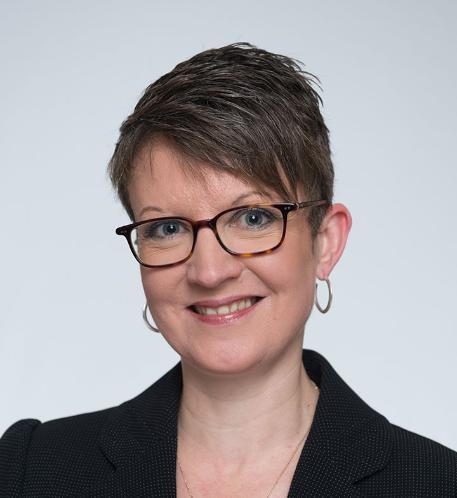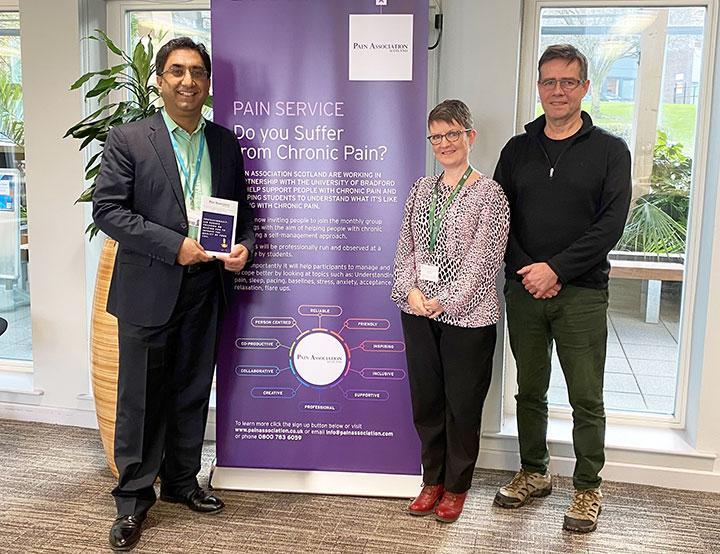The Pain Clinic at DHEZ
A partnership with Pain Association Scotland to help people manage their chronic pain
Pain Association Scotland are working in partnership with University of Bradford through monthly meetings to help support people with chronic pain, hosted in DHEZ from Sept 2023 to June 2024. The sessions will guide participants to use a self-management approach and help them to cope better by looking at topics such as understanding pain, sleep, stress, anxiety, acceptance and flare ups. Sessions will be professionally run and observed at a distance by students to help them understand more about the management of the condition.
We caught up with Professor Sonia Cottom, Director of Pain Association Scotland, to find out more about the partnership.
How did the partnership come about? – Bradford's quite a long way from Scotland...
So although we're called Pain Association Scotland, we've been doing a lot of work in England, Wales and now Ireland, and we're registered as a national charity across the UK.
I was introduced to Bradford through somebody who’s now moved on, but through this connection I met Prof Zahir Irani and following a number of conversations he agreed to be on our national management committee. Zahir mentioned that there was no chronic pain clinic in Bradford because that had closed down, and we identified that it was potentially a gapwe could fill.
We were aware that the makeup of Bradford means that there are potentially many people struggling who are less likely to reach out and disclose that they have chronic pain due to their cultural beliefs, so we reached out among community groups identified by the University to gauge interest, and it got a positive response.

Professor Sonia Cottom, Director of Pain Association Scotland
What does a session at the pain clinic look like?
The monthly sessions usually have a set topic as a loose structure, but we’re responsive to the needs of the participants, so if someone says they’ve been having issues with relaxation and switching off, for example, we’re flexible enough to change the focus and switch to this as a subject. That means exploring the issue and posing questions like “What's causing the lack of relaxation?” and examining people’s routines and habits to see where there may be triggers for stress, and offering alternative options and techniques that have worked for others.
It’s a space where participants can feel they can engage in discussions and activities as much as they are comfortable with, and they don’t have to attend every session, they can dip in and out as required. We also provide lunch and can support with travel costs to remove barriers to people being able to attend.
Can you tell us about the student involvement in the sessions?
As the DHEZ is both a community space and part of the University, it seemed like an ideal opportunity to give students who will go on to be healthcare professionals an insight into chronic pain and self-management, as one of our challenges as an organisation is lack of awareness of our services across medical professions. So last year we started off by inviting Psychology students, and we then opened it up to Physiotherapy and hopefully Pharmacy students will also be taking part soon.
The students come in and observe the community group in the morning and then in the afternoon we kind of do a lecture and discuss what they’ve observed and learned.
Two third year psychology students are doing an evaluation on the clinics, which is really exciting, and we’re running again this year as a proof-of-concept which will be evaluated and then fully integrated into the curriculum next year if all goes well.

Prof Amir Sharif from University of Bradford with Prof Sonia Cottom and Phil Sizer from Pain Association Scotland.
How do you measure the success of the clinics?
We know that we need to show positive results to the organisations who will potentially refer people to us, so every year we do a service user questionnaire. We’re seeing great responses: in the last year 62% of respondents said they access their GP less and they’re not as reliant on their medications, and the majority of respondents said they had a better quality of life and were better able to cope with their pain.
How can someone with chronic pain access the clinics?
If you’re interested, please get in touch by emailing [email protected] or calling on 0800 783 6059.

